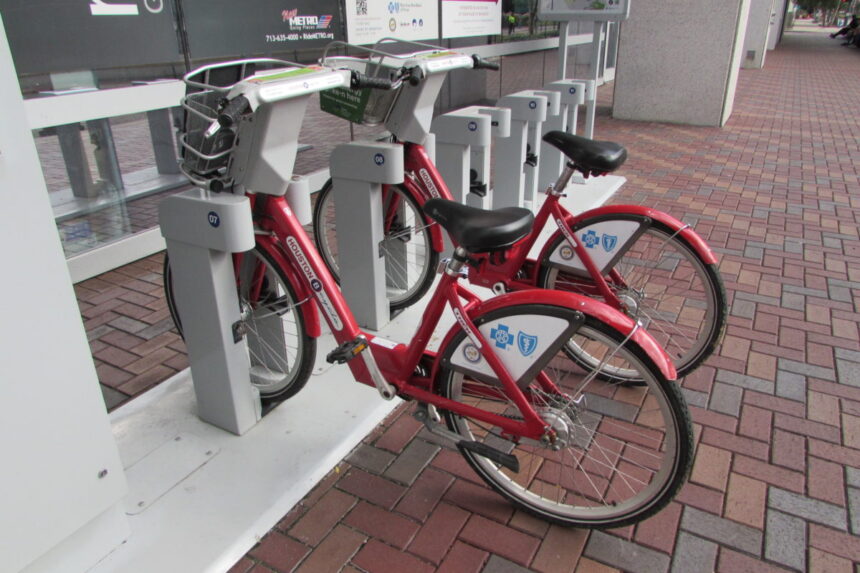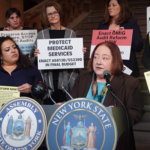Houston will soon be without a bike-sharing network for the first time in more than a decade.
Houston BCycle, which was created by the city government in 2012 and grew to as many as 160 stations in recent years, will cease operations at the end of June amidst declining revenues, escalating costs and deteriorating infrastructure, according to a member of its board of directors.
The nonprofit network, which offers both traditional and electric bikes as a mode of transportation and also for recreational use, already had planned to wind down its operations after getting a $500,000 infusion last fall from the city. Houston BCycle’s plan at the time was to keep going until METRO, the region’s transit provider, could stand up a network of its own.
“It’s a really difficult decision,” James Llamas, the vice chair for the BCycle board, said Friday. “We think bike share is great for the city of Houston. We know Houstonians love bike share. Unfortunately, as directors of a nonprofit, we don’t have the option to run out of money. We have to look at the finances we have and had to come to the difficult realization that they were no longer sufficient to carry out our mission.”
METRO’s board of directors voted last September to spend $10 million on a five-year bike-sharing contract with Quebec-based PBSC Urban Solutions. But it is unclear whether the transit agency, which has since undergone leadership changes, is moving forward with that plan.
METRO did not comment Friday on the status of the arrangement.
Jordan Levine, a spokesperson for PBSC Urban Solutions, indicated in a statement that a deal could still materialize.
“As a bike share equipment provider with experience in more than 50 cities globally we are confident we are the right team to help METRO deliver Harris County a world-class bike share program,” Levine said. “Our team is eager to get to work in order to ensure there are no gaps in service for riders.”
Joe Cutrufo, the executive director of cycling advocacy nonprofit BikeHouston, urged the transit agency to proceed with the deal as planned. He said there are Houston residents and visitors alike who have relied on the bike-sharing network for their daily transportation needs.
“METRO’s board voted unanimously last year to invest in a state-of-the-art bike share system because they understood that it can expand the footprint of the transportation system by providing easy first- and last-mile access,” Cutrufo said. “That’s squarely in line with the new chair’s focus on attracting new riders.”
Houston BCycle’s ridership reached a peak of about 30,000 per month in the summer of 2022, according to Llamas, who said revenues struggled to keep up with operating costs as the nonprofit tried to shift from a primarily recreational service to a more transit-oriented network. Sponsorships started dwindling after the onset of the COVID-19 pandemic, he said, and monthly ridership dipped below 10,000 after BCycle increased its prices and closed many of its stations.
The network reduced its prices this February, while also partnering with local management districts and Rice University to reopen some of the stations that had closed. That provided a boost in ridership, Llamas said, but the organization could not secure additional funding from county, municipal or state agencies.
“Bike share systems across the United States have experienced similar challenges,” Jennifer Ostlind, the interim director of the city’s Planning and Development Department, said in a statement Friday. “Houston’s system has outlived many others, but we have learned that successful systems that serve more than just recreational purposes require corporate and public support to remain viable.”
A spokesperson for Houston Mayor John Whitmire, who was elected in December and appointed some of the new board members for METRO, did not immediately respond to an email Friday seeking to determine whether he would support a new bike share system. His administration has been critical of infrastructure projects that expand bicycle lanes at the expense of vehicle lanes, a departure from the tenure of his predecessor, Sylvester Turner, whose administration extended the aforementioned $500,000 lifeline to BCycle.
Llamas said it’s “really unfortunate” that Houston will soon be the largest city in the U.S. without a bike share network. About 80 stations are expected to remain open through the end of June, after which the city-owned BCycle equipment will be removed and sold.
“I think we’ve demonstrated that Houston has an appetite or bike share and it can be successful even in a relatively low-density, auto-oriented city,” Llamas said. “We hope there can be a solution worked out so some form of bike-sharing can continue.”










